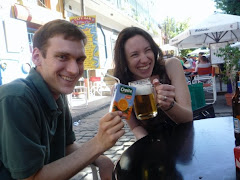The Russian Alphabet

In Akhalkalaki, we mostly use Russian for our interactions. I teach at the Russian school, so instruction in classes is all in Russian (and consequently I have learned a lot of really ridiculous grammar terms in Russian). Sam’s school is one of the Armenian-language schools, so he has a lot more daily exposure to Armenian, but we both get an earful every day. Even though we could probably get by without studying any Armenian, it’s been a nice challenge and people in town seem to be genuinely happy and flattered that we are trying to learn. (We still try to study Georgian some, since it’s important when we travel to other parts of Georgia and for the above named reasons of us being fairly dorky and loving languages. Not many people in town know Georgian, though, so we don’t have a lot of chances on a day-to-day basis to speak or hear Georgian.)
The Georgian Alphabet

Since August, we have been studying Armenian. We’ve gotten pretty decent and can read and write and say a lot. The problem is, this Armenian we’ve been studying hasn’t been especially helpful in understanding folks in town. Akhalkalaki has its own unique dialect, which isn’t exactly like the literary Armenian we’ve been studying. In fact, it’s really incredibly different. Sam says that the difference between literary Armenian and the Akhalkalaki dialect is roughly on par with the difference between Modern Standard Arabic and the Egyptian dialect. The Akhalkalaki dialect incorporates a lot of words from Turkish, Russian, Georgian and Persian, and most people in town say that it is based on Western Armenian, as opposed to the Eastern Armenian that literary Armenian is based on. Everyday items are especially likely to differ in literary Armenian versus the dialect, so the things we are most likely to hear people talk about are the things we have the hardest time understanding.
The Armenian Alphabet

The Armenian dialect spoken in Yerevan is pretty similar to literary Armenian, although it, of course, has its own slang as well. I’ve been working to try to improve my listening comprehension by watching some of the Armenian soap operas that are shown each night. (This has, incidentally, helped me bond with our host grandmother. Now, whenever the theme music for our favorite show, “Anna,” comes on, she shouts to me to come gather round to watch.) It always helps pick me up a bit to know that, when it’s literary Armenian, I can hear it and understand. I have tended to get frustrated that even though we’ve been studying hard in our thrice-weekly lessons, I still can’t understand when people are sitting around talking in dialect. Moreover, it’s interesting for me to watch the show with our host family and see that there are times when they have trouble understanding—not huge problems, but words here and there that they don’t know. The other night, a main character was visited at home by two policemen who said, “You are under arrest.” These were the last words of the show, a dramatic ending for the weekend break. Only, no one watching with me understood what was said. They use the Russian word for arrested, so didn’t know the literary Armenian word. It took a bit of asking around to other host family members (ones who went to university in Armenia and know literary Armenian as well) to figure out what had happened.
Each day brings bits of progress though, whether it’s in the form of me understanding when a kid in my English class who never does any work says in dialect “why is she talking to me? I don’t know any English!” or in the form of being able to have a grocery store employee understand us as we ask for ice cream in literary Armenian. We get a lot of smiles and laughs and lots of people make fun of our mistakes and accents, but there has been progress. And at the very least, it’s nice to be able to give my students a hard time when they haven’t done their homework or don’t want to work in class by pointing out that I can say more in Armenian after 8 months of study than they can in English after 5 years. It’s the little things, really.




Ella is devastated (she devastates easily) that she does not have an accent since I told her that if she hears someone who speaks differently than she does, it means that they speak another language and are pretty smart and hardworking. She also wants an accent since Anna Trebunskaya on Dancing with the Stars has one, as do Dan and Nikita and Diego in her class. So there's your challenge for wedding weekend - teach Ella to speak with an accent!
ReplyDeleteI'm glad to see you've reached a level of maturity that you don't take delight in being able to "one up" a 5th grader!! The apple doesn't fall far...
ReplyDeleteAssuming you progressed in both, could you please describe some differences between the Akhalkalaki dialect and standard (Eastern) Armenian? I visited Akhalkalaki briefly, and when I heard them speak Armenian, it just sounded like mumbling to me. But that might be because I didn't know what to listen for. I (an American) tried speaking to them in Georgian. I would say about half of the people understood me, but they would always answer me back in Russian, which was not helpful because I know very little. My impression was that the Armenians in Akhaltsikhe knew more Georgian than those in Akhalkalaki.
ReplyDelete